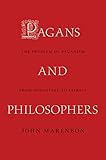Pagans and Philosophers : The Problem of Paganism from Augustine to Leibniz / John Marenbon.
Material type: TextPublisher: Princeton, NJ : Princeton University Press, [2015]Copyright date: ©2015Edition: Pilot project. eBook available to selected US libraries onlyDescription: 1 online resource (328 p.)Content type:
TextPublisher: Princeton, NJ : Princeton University Press, [2015]Copyright date: ©2015Edition: Pilot project. eBook available to selected US libraries onlyDescription: 1 online resource (328 p.)Content type: - 9780691142555
- 9781400866359
- Paganism -- History
- Philosophy and religion
- Philosophy -- History
- RELIGION / Philosophy
- Acts of the Apostles
- America
- Anicius Manlius Severinus Boethius
- Aristotelians
- Aristotle
- Arts Faculties
- Asia
- Augustine of Hippo
- Augustine
- Boethius
- China
- Chinese philosophers
- Chinese religion
- Christian Europe
- Christian belief
- Christian teachers
- Christianity
- Christianization
- City of God
- Collationes
- Consolation of Philosophy
- Dante Alighieri
- Early Middle Ages
- English poets
- Entheticus de dogmate philosophorum
- Epicurus
- Europe
- Geoffrey Chaucer
- Giovanni Boccaccio
- Gottfried Willhelm Leibniz
- Hell
- Historical Synthesis
- John of Piano Carpini
- John of Salisbury
- Long Middle Ages
- Middle Ages
- Mongols
- Paganism
- Peter Abelard
- Policraticus
- Problem of Paganism
- Roman history
- The Book of John Mandeville
- Theologia Christiana
- Theologia Summi Boni
- University of Oxford
- University of Paris
- Western Europe
- Willehalm
- William Langland
- William of Rubruk
- ancient models and language
- ancient paganism
- ancient pagans
- classical antiquity
- contemporary pagans
- early medieval scholars
- encyclopaedic tradition
- higher education
- humanism
- knowledge
- modernity
- pagan culture
- pagan knowledge
- pagan salvation
- pagan society
- pagan virtue
- pagan wisdom
- paganism
- pagans
- philosophy
- relativism
- sack of Rome
- salvation
- theological challenges
- theological problems
- theoretical developments
- universities
- university theologians
- unknown pagan peoples
- virtue
- virtuous pagans
- wisdom
- 261.22 23
- BL432 .M37 2017
- online - DeGruyter
- Issued also in print.
| Item type | Current library | Call number | URL | Status | Notes | Barcode | |
|---|---|---|---|---|---|---|---|
 eBook
eBook
|
Biblioteca "Angelicum" Pont. Univ. S.Tommaso d'Aquino Nuvola online | online - DeGruyter (Browse shelf(Opens below)) | Online access | Not for loan (Accesso limitato) | Accesso per gli utenti autorizzati / Access for authorized users | (dgr)9781400866359 |
Frontmatter -- Contents -- Preface -- A Note on References and Citations -- Introduction: The Problem of Paganism -- Part I: The Problem Takes Shape -- CHAPTER 1. Prelude: Before Augustine -- CHAPTER 2. Augustine -- CHAPTER 3. Boethius -- Part II: From Alcuin to Langland -- CHAPTER 4. The Early Middle Ages and the Christianization of Europe -- CHAPTER 5. Abelard -- CHAPTER 6. John of Salisbury and the Encyclopaedic Tradition -- CHAPTER 7. Arabi, Mongolia and Beyond: Contemporary Pagans in the Thirteenth and Fourteenth Centuries -- CHAPTER 8. Aristotelian Wisdom: Unity, Rejection or Relativism -- CHAPTER 9. University Theologians on Pagan Virtue and Salvation -- CHAPTER 10. Dante and Boccaccio -- CHAPTER 11. Langland and Chaucer -- Part III: The Continuity of the Problem of Paganism, 1400-1700 -- CHAPTER 12. Pagan Knowledge, 1400-1700 -- CHAPTER 13. Pagan Virtue, 1400-1700 -- CHAPTER 14. The Salvation of Pagans, 1400-1700 -- EPILOGUE. Leibniz and China -- General Conclusion -- Bibliography -- Index
restricted access online access with authorization star
http://purl.org/coar/access_right/c_16ec
From the turn of the fifth century to the beginning of the eighteenth, Christian writers were fascinated and troubled by the "Problem of Paganism," which this book identifies and examines for the first time. How could the wisdom and virtue of the great thinkers of antiquity be reconciled with the fact that they were pagans and, many thought, damned? Related questions were raised by encounters with contemporary pagans in northern Europe, Mongolia, and, later, America and China.Pagans and Philosophers explores how writers-philosophers and theologians, but also poets such as Dante, Chaucer, and Langland, and travelers such as Las Casas and Ricci-tackled the Problem of Paganism. Augustine and Boethius set its terms, while Peter Abelard and John of Salisbury were important early advocates of pagan wisdom and virtue. University theologians such as Aquinas, Scotus, Ockham, and Bradwardine, and later thinkers such as Ficino, Valla, More, Bayle, and Leibniz, explored the difficulty in depth. Meanwhile, Albert the Great inspired Boethius of Dacia and others to create a relativist conception of scientific knowledge that allowed Christian teachers to remain faithful Aristotelians. At the same time, early anthropologists such as John of Piano Carpini, John Mandeville, and Montaigne developed other sorts of relativism in response to the issue.A sweeping and original account of an important but neglected chapter in Western intellectual history, Pagans and Philosophers provides a new perspective on nothing less than the entire period between the classical and the modern world.
Issued also in print.
Mode of access: Internet via World Wide Web.
In English.
Description based on online resource; title from PDF title page (publisher's Web site, viewed 29. Jul 2021)


